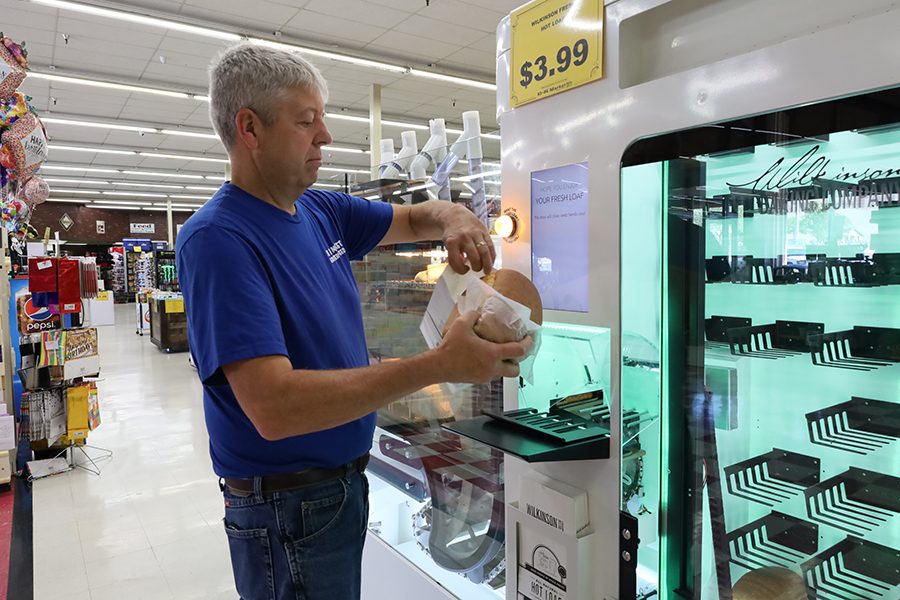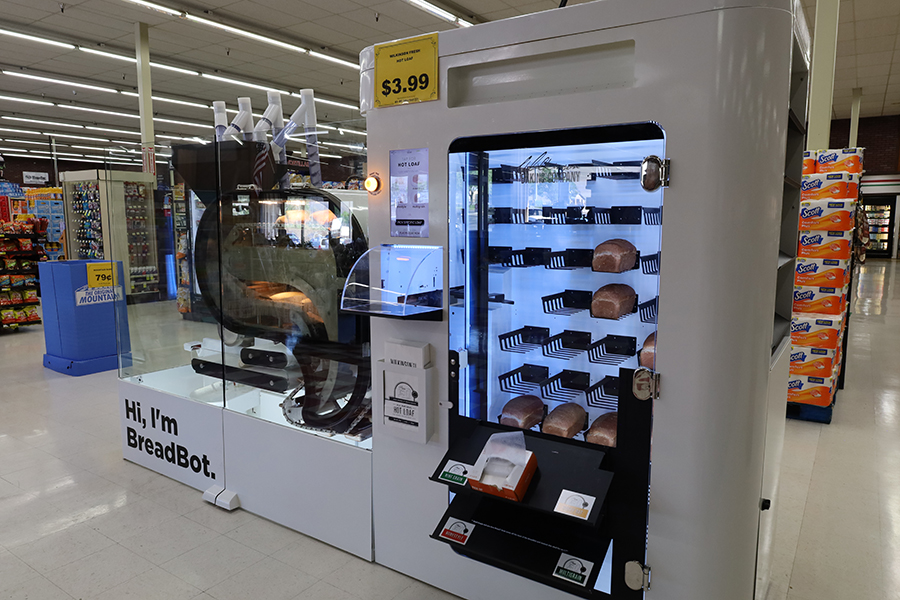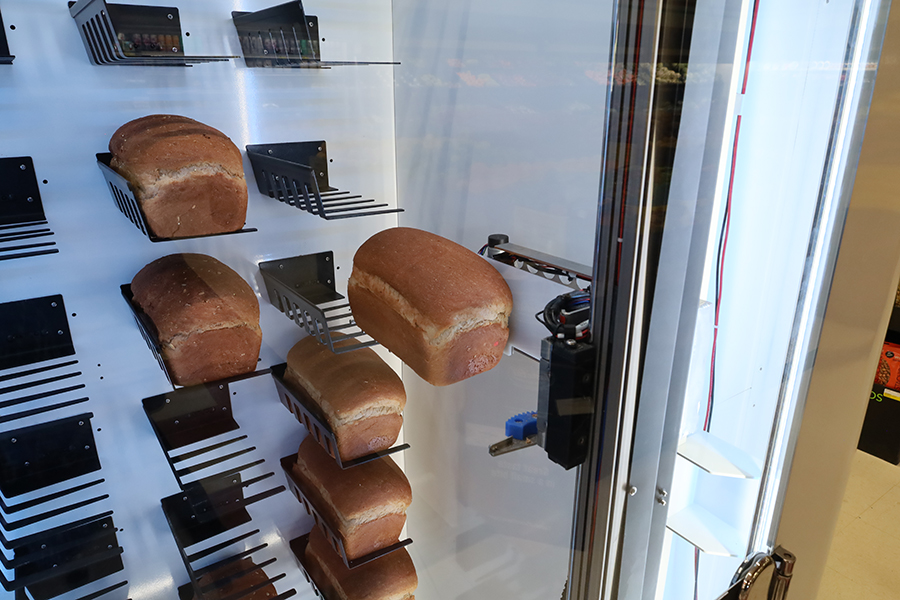
Home » Bread-baking robot charms customers at local store
Automated oven
Bread-baking robot charms customers at local store

Mark Loften, who owns Ki-Be Market Grocery and Feed with his wife, Lori, takes a fresh loaf of bread out of the store's new BreadBot.
Photo by Rachel VisickJune 14, 2024
Customers need only follow their nose to the scent of fresh-baked bread to meet the newest member of the Ki-Be Market team – a bread-baking robot.
The BreadBot made its debut at the Benton City grocery store on June 4. Front and center at the small grocery store at 1215 Horne Drive, the BreadBot is hard to miss.
“It’s a fully automated … bread-baking machine that goes in supermarkets and makes bread fresh and local right in front of the customer,” said Eric Wilkinson, co-owner and co-founder of Walla Walla-based Wilkinson Baking Co., the inventor of the BreadBot.
The machine, which is just under 11 feet long and 4 feet wide, bakes a fresh loaf of bread every six minutes. At 10 loaves per hour, its capacity is more than 100 loaves a day.
The BreadBot has generated plenty of excitement since its debut.
Mark Loften, who owns Ki-Be Market Grocery and Feed with his wife, Lori, said 60 loaves were sold on day one, a bounty that grew to 72 the second day and 84 the third. Loften expects those numbers to level off over time, but it’s clear that both the store’s owners and customers are excited.
Within the first four days, some customers had even come back saying that they had eaten the whole loaf already. One customer saw Ki-Be Market’s Facebook post and drove from Pasco to see the BreadBot in action.
Loften animatedly describes the BreadBot’s process to anyone who stops to take a look. He said that the customers are amazed to find a machine like this in a small store, and that’s something that the Loftens try to cultivate.
“We want them to walk in the store, to go, ‘Wow, this isn’t your normal little store’ … Anything we can do to make them go, ‘This isn’t what I expected,’” said Loften, explaining that’s it’s always best to “make the party better than the invitation.”

The Ki-Be Market Grocery and Feed in Benton City recently added an automated bread-baking machine to its store.
| Photo by Rachel VisickThe best every day
The owners of Ki-Be Market saw a BreadBot prototype in Walla Walla about eight years ago, but Wilkinson Baking Co. wasn’t yet ready to launch them into the world. After seeing one in Idaho last year, Loften reached out to the company again.
The Loftens are always looking for something new for their store. It goes along with the market’s motto, “Benton City will get our very best every day,” Loften said. “So we, as owners, always go out and try and find … what can we bring into the store that’s going to give (customers) a better experience?”
A few years ago, it was an orange juice machine, which automatically slices and squeezes oranges to make fresh juice on demand. It’s still popular.
Bot baking
The bot’s baking process is visible to customers through the glass panes that surround the machinery.
“A lot of the excitement’s kind of gone out of bread. It just kind of sits there,” Wilkinson said. To get people interested, the inventors thought to “make it a theater.”
The BreadBot automatically turns on at a set time each morning, then it gets baking.
First, the robotics measure out the flour and yeast onto a scale. Once weighed, the dry ingredients drop into a mixer, where water is added and mixed into a dough ball.
The machines knead the ball into a log, which is then placed into a pan. The dough spends 50 to 60 minutes proofing, or letting the yeast activate, before baking for 20 to 25 minutes.
Once complete, the pan tips the bread onto a robotic arm, which carries it to a cooling rack and subsequently to the window where customers can pick it up.

The BreadBot’s robotic arm moves a loaf of bread from the oven to the cooling rack.
| Photo by Rachel VisickAll along the way, more than 150 sensors keep track of the dough, and more than 20 motors are used to move ingredients around.
Loften has an app that allows him to see exactly which stage the loaves of bread are in at any given time.
Customers can watch the BreadBot’s screen to see exactly how long a loaf has been out of the oven, allowing them to select the freshest bread for purchase.
Ki-Be Market’s BreadBot currently produces honey oat, nine grain, homestyle and multigrain bread, which sell for $3.99 each.
If the loaves stay on the cooling racks long enough, staff will take them out to be sliced and placed at the back of the machine. It’s one of the few human-operated aspects of the system, along with wiping down parts of the machine that aren’t automatically cleaned at the end of the day and adding the bread mixes.
Loften said that the BreadBot hasn’t changed anything in terms of staffing at the Ki-Be market, which employs around 29 workers.
Loaf love
Wilkinson Baking Co. built its first “mini bakery” in 2016, a feat that took two and a half years for the three people working on it.
The first models were put into stores in 2019, but the robotic bread maker has come a long way since then.
“The first one was pretty rough. We put it into about four or five stores and then kind of pulled them and then worked on it again, and then did that one more time,” Wilkinson said. “Now, we feel like we’re ready to roll out with this one.”
The third-generation BreadBots hit the market about 16 months ago, and the first one was installed in Andy’s Market in College Place. The very first store to see one of the baking bots was the Super 1 Foods in Walla Walla.
The installation fee for the BreadBot ranges from $3,000 to $7,000, depending on the distance from Walla Walla, plus a $1,000-per-month lease fee, according to information on the company’s website.
Because Wilkinson Baking Co. covers the cost of mixes, materials and shipping, the company also charges a bake fee on each loaf.
Wilkinson’s motivation behind the invention was decentralizing the bread system. He said that they hoped the in-store automated bakeries could help replace the old model of centralized bread production.
“That way you don’t have to have preservatives,” he said, “because from the centralized factory … you can get up to … five, six, seven days old by the time it hits the shelf. So it’s not really fresh anymore.”
“Our goal is to change how bread’s made,” he said.
Wilkinson noted that they aren’t seeking to compete with local and artisan bread makers, but rather with the centralized factory system. That’s why the BreadBots are designed to be placed in grocery stores.
Wilkinson Baking Co. has distributed 15 bots across Washington, Idaho, Montana and Utah, and there’s one machine in Boston, Massachusetts. He said the company hopes to get to 20 by the end of the year and then ramp it up after that.
Wilkinson Baking Co. remains involved in Ki-Be Market’s BreadBot, monitoring it through a camera and calling if anything goes awry. Loften said the company visits once a month to do maintenance.
In the future, the company may be able to replace breads that aren’t selling as well with new mixes. Wilkinson said that a sourdough mix is in the works.
Latest News Local News Food & Wine Science & Technology
KEYWORDS June 2024
Related Articles




